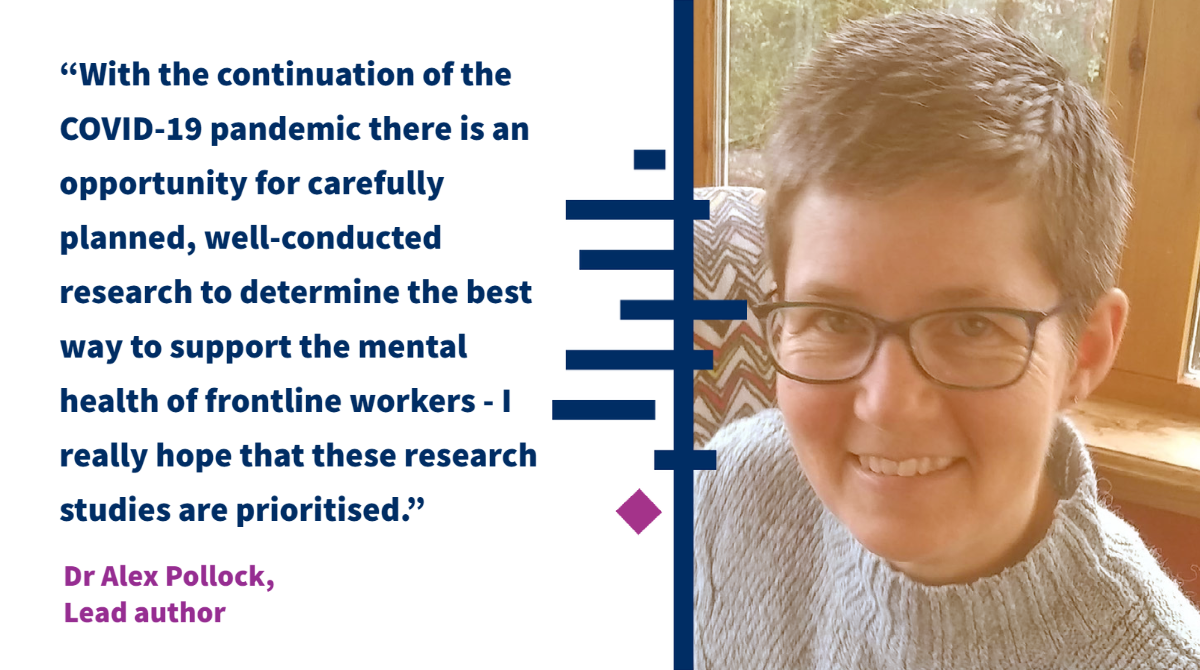
What is the best way to support resilience and mental well-being in frontline healthcare professionals during and after a pandemic? What is ‘resilience’?
Working as a 'frontline' health or social care professional during a global disease pandemic, like COVID-19, can be very stressful. Over time, the negative effects of stress can lead to mental health problems such as depression and anxiety, which, in turn, may affect work, family and other social relationships. ‘Resilience’ is the ability to cope with the negative effects of stress and so avoid mental health problems and their wider effects. Healthcare providers can use various strategies (interventions) to support resilience and mental well-being in their frontline healthcare professionals. These could include work-based interventions, such as changing routines or improving equipment; or psychological support interventions, such as counselling.
What did the review authors want to find out?
Firstly, they wanted to know how successfully any interventions improved frontline health professionals’ resilience or mental well-being. Secondly, the authors wanted to know what made it easier (facilitators) or harder (barriers) to deliver these interventions.
Key message
The authors did not find any evidence that tells us about how well different strategies work at supporting the resilience and mental well-being of frontline workers. They found some limited evidence about things that might help successful delivery of interventions. Properly planned research studies to find out the best ways to support the resilience and mental well-being of health and social care workers are urgently required.
Lead author of this review Dr Alex Pollock explains, “It is clear that frontline healthcare workers have to deal with enormous stress when working in any infectious disease epidemic, and this clearly has a negative impact on their mental health. Despite this, there remains a lack of high quality research about how best to support the mental health of these workers. With the continuation of the COVID-19 pandemic there is an opportunity for carefully planned, well-conducted research to determine the best way to support the mental health of frontline workers - I really hope that these research studies are prioritised. While we found a lack of high quality research in this review, it is important to note that our focus was limited to evidence relating to healthcare professionals working during infectious disease epidemics / pandemics. It’s clear that we now need to expand the scope of this review and turn to evidence from other diseases and health crises. We also need to bring together evidence about how best to prepare people for frontline work. Finally, it’s important to remember that the majority of people who work at the frontline are not healthcare professionals, but are, for example, porters or cleaners. We need to make sure that future research addresses ways to support this wider workforce.”

What did the author team do?
They searched medical databases for any kind of study that investigated interventions designed to support resilience and mental well-being in healthcare professionals working at the front line during infectious disease outbreaks. The disease outbreaks had to be classified by the World Health Organization (WHO) as epidemics or pandemics and take place from the year 2002 onwards (the year before the severe acute respiratory syndrome (SARS) outbreak).
What did they find?
16 relevant studies were identified. These studies came from different disease outbreaks - two were from SARS; nine from Ebola; one from Middle East respiratory syndrome (MERS); and four from COVID-19. The studies mainly looked at workplace interventions that involved either psychological support (for example, counselling or seeing a psychologist) or work-based interventions (for example, giving training, or changing routines).
Objective 1: one study investigated how well an intervention worked. This study was carried out immediately after the Ebola outbreak, and investigated whether staff who were training to give other people (such as patients and their family members) 'psychological first aid' felt less ‘burnt out’. The authors had some concerns about the results that this study reported and about some of its methods. This means that confidence in the evidence is very low and the authors cannot say whether the intervention helped or not.
Objective 2: all 16 studies provided some evidence about barriers and facilitators to implement interventions. The author team found 17 main findings from these studies. They do not have high confidence in any of the findings and had moderate confidence in six findings and low to very low confidence in 11 findings.
The authors are moderately confident that the following two factors were barriers to implementation of an intervention: frontline workers, or the organisations in which they worked, not being fully aware of what they needed to support their mental well-being; and a lack of equipment, staff time or skills needed for an intervention. The authors are moderately confident that the following three factors were facilitators to implementation of an intervention: interventions that could be adapted for a local area; having effective communication, both formally within an organisation and informal or social networks; and having positive, safe and supportive learning environments for frontline healthcare professionals. The authors are moderately confident that the knowledge and beliefs that frontline healthcare professionals have about an intervention can either help or hinder implementation of the intervention.




